A CRUSHED GRANITE PATIO OR PATHWAY: COULD IT BE RIGHT FOR YOU?
Crushed granite, which is also known as decomposed granite, can be an excellent option for an outdoor patio or pathway. In this blog post, we’ll explain what decomposed granite (or DG) is and some of the advantages it can offer your next hardscaping project.
Featured Photo: Decomposed granite pathway stabilized with Gator Stone Bond. Project installed by Bach & Co. of Clayton, NY.
What is decomposed granite?
Decomposed granite, or DG, is composed of very fine granite particles (typically 3/8-inch or smaller). A product of the natural erosion of solid granite, DG is a popular hardscaping material used in the southern/southwestern regions of the U.S. Due to its soft and natural appearance, along with being permeable, this product can actually be used in a wide variety of applications and settings.
Types of Decomposed Granite (DG)
Loose DG: Loose DG is decomposed granite in its natural form, without any additives. It is the least expensive DG option and can be used in garden beds. It holds up far better than other commonly used mulching materials and won’t attract pests. While loose DG can be used for pathways or patios, it does not contain any stabilizers and is therefore best suited for very low-traffic areas. In rainy conditions, loose DG will become muddy and messy so it shouldn’t be installed in areas where it can be easily tracked indoors.
Stabilized DG: As its name implies, the aggregates in stabilized DG are mixed with a stabilizer, making it less susceptible to erosion and weathering. Both its long lifespan and low level of required maintenance makes stabilized DG a fantastic option for patios and pathways.
DG With Resin: The most costly form of DG, the resins in this product will create a surface that’s very similar to asphalt. It’s the strongest and most durable type of DG and therefore ideal for driveways or other high traffic areas. However, with this added level of strength comes a significant decrease in permeability.
Pros and Cons
If you’re considering DG for an upcoming hardscape project, here are the pros and cons you’ll want to keep in mind:
PROS
- Perfect solution for xeriscaping
- Available in a variety of colors
- Fairly inexpensive
- Loose and stabilized DG are highly permeable
- Provides a soft and natural appearance
- Relatively easy to install
- Gritty texture for excellent traction underfoot
- Stabilized DG and DG with resin are low maintenance
- Loose DG is a great mulching material
CONS
- Loose DG will easily erode and become muddy when wet
- DG with resin does not provide good drainage
- May need to be refilled from time to time and matching up the exact color may be difficult (it’s recommended to keep some of the original on hand)
- Loose DG can be tracked indoors and damage hardwood flooring
So now you decide ... is decomposed granite a good fit for your next project?

